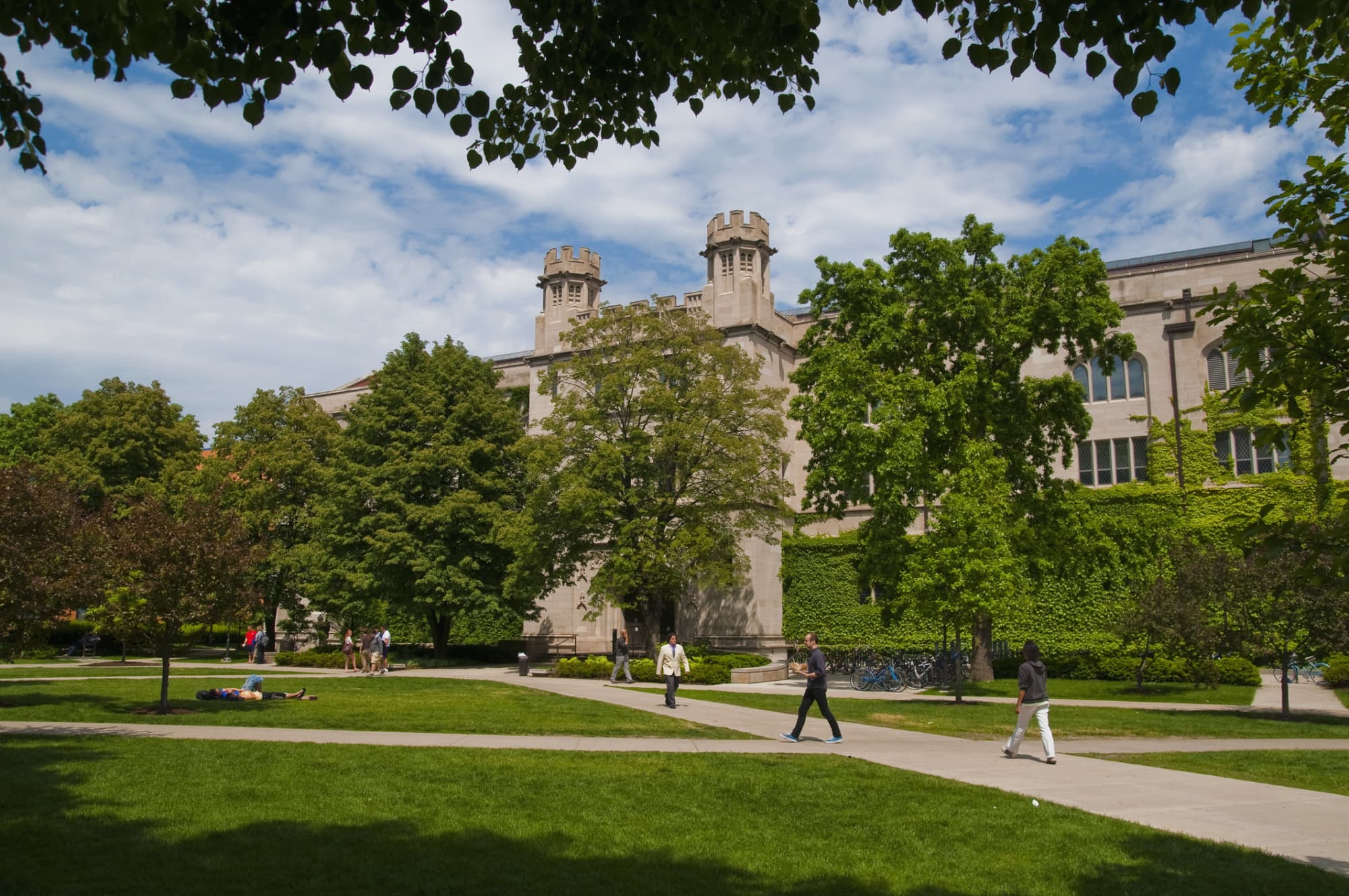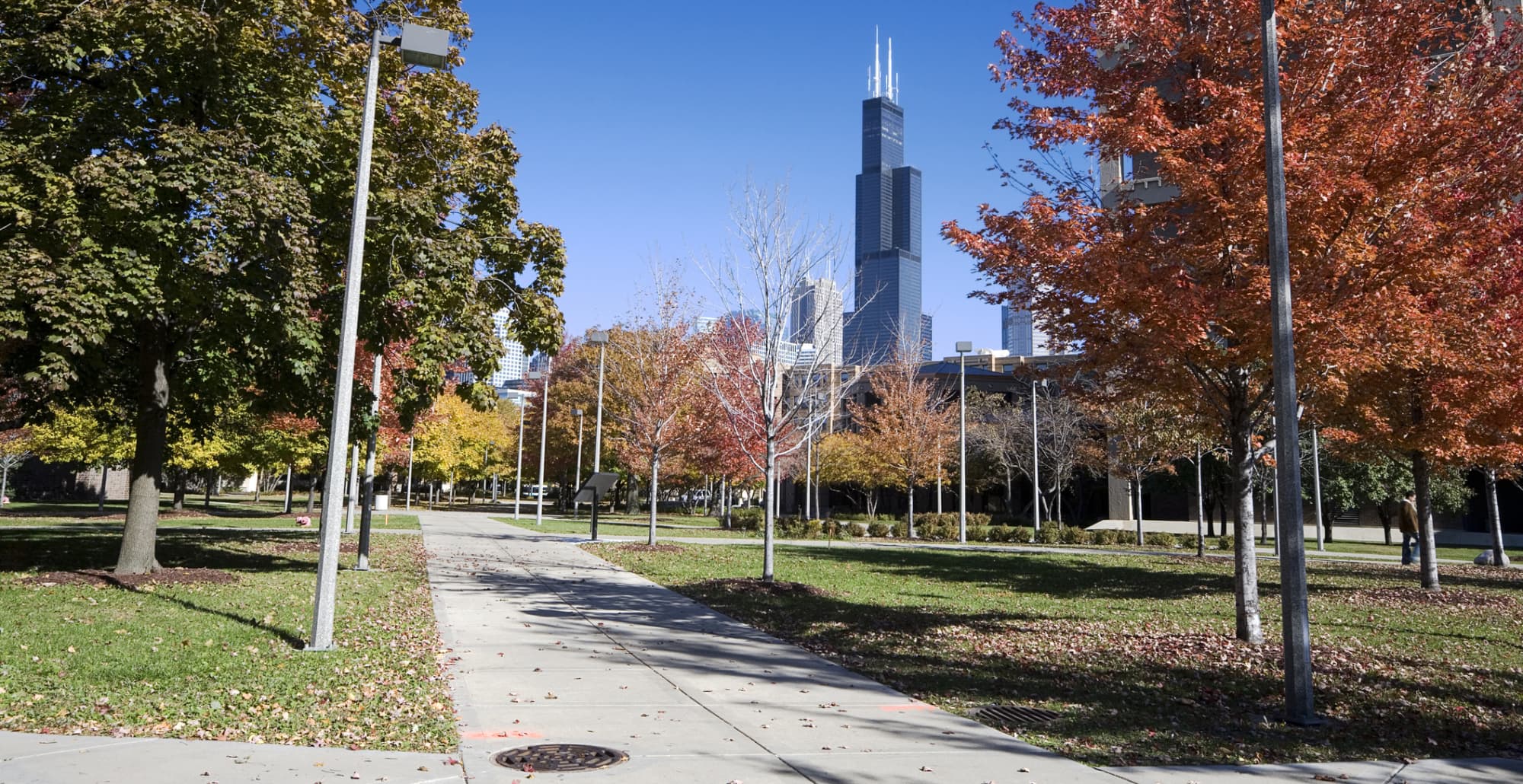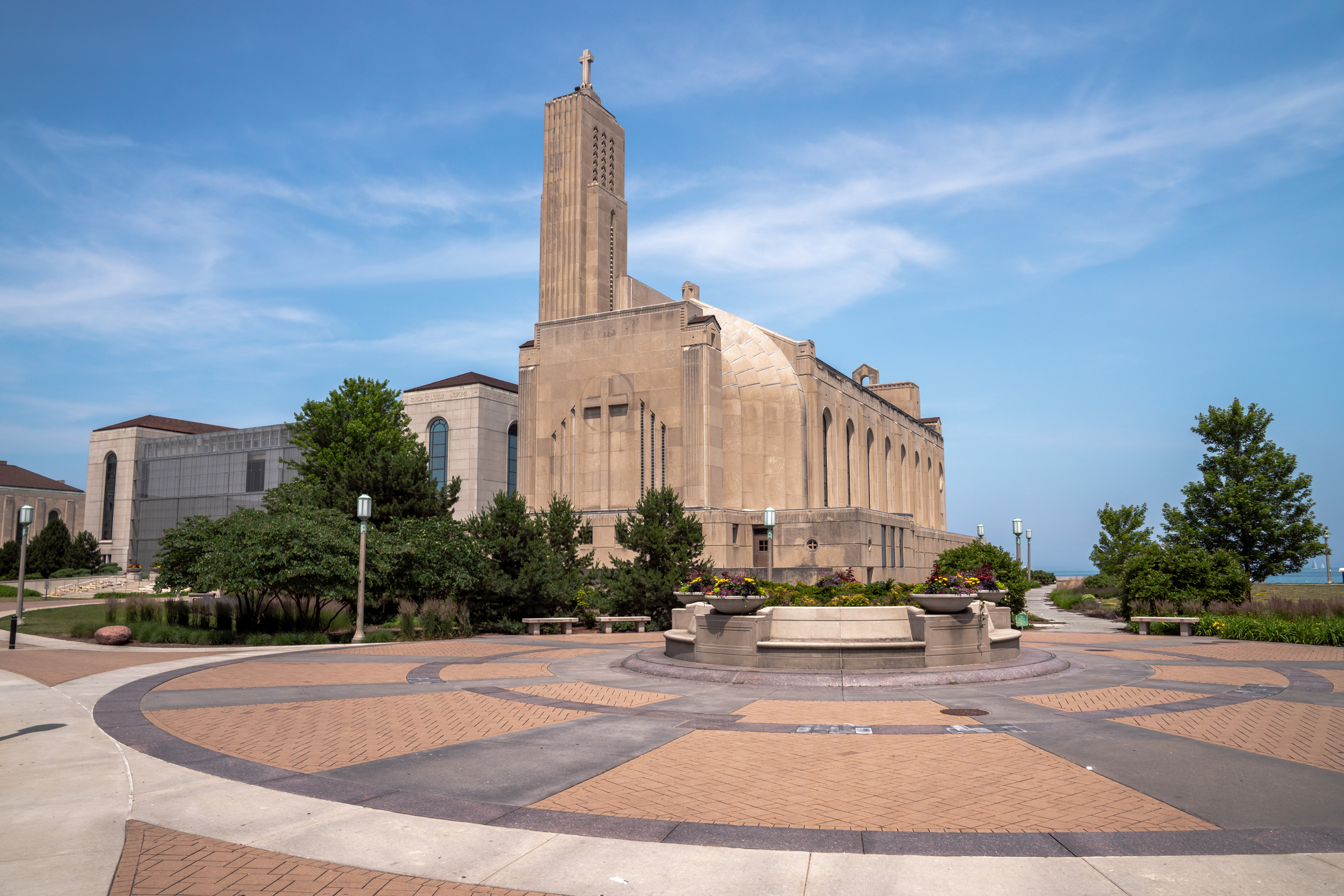MBA Programs in Chicago Overview
Chicago is the third-largest city in the United States after New York and Los Angeles. The “Windy City” is known for its architecture, culture, and proximity to Lake Michigan.
Known as one of the world’s financial centers, the city also has strong telecommunications and infrastructure industries. According to Forbes, Chicago has a projected job growth rate of .9%, which is less than in other major cities.
Still, the city has a strong business climate. Some of the largest publicly traded companies in Chicago and the surrounding area include Walgreens Boots Alliance Inc., Boeing Inc., Archer Daniels Midland Co., and Caterpillar Inc.
Some leaders at these organizations and others earned their MBA degrees at business schools in Chicago. The city’s most common occupations requiring MBA degrees include general and operations managers, accountants and auditors, and management analysts.
Read on to learn more about three of the top business schools in Chicago and why you should consider pursuing your degree in the windy city.
| Population | 12,671,469 |
| Climate | Average Annual Temperature: 51.8 F Annual Precipitation: 39.2 inches |
| Number of Higher Learning Institutions | 152 |
| Per Capita Income | $39,571 |
| Fortune 500 Companies | 38 |
Popular Online MBA Programs
Learn about start dates, transferring credits, availability of financial aid, and more by contacting the universities below.
3 Business Schools in Chicago

University of Chicago
The University of Chicago is a highly selective university, with an admission rate of only about 7%. The Booth School of Business admitted around 23% of applicants in 2021. The medium-sized, private university enrolls around 7,000 undergraduates and over 10,000 graduate students.
Booth School of Business
The Booth School of Business has four delivery methods for its MBA programs.
Students complete the full-time MBA at the Chicago campus. Enrollees complete this program in 21 months, participating in an internship midway through their studies. Typically, business professionals work for 3-8 years before starting this degree program.
The evening or weekend MBA programs take 2.5-3 years. Students work an average of 3-11 years before enrolling. Learners take classes in downtown Chicago on weekday evenings or on Saturdays.
Students can complete the executive MBA in Chicago, London, or Hong Kong. Attracting professionals with an average of 8-20 years of work experience, the programs takes about 22 months to finish.
Booth’s MBA Specializations
Financial Accounting | Microeconomics | Statistics | Finance | Marketing | Operations | Strategy | Decisions | People | Economy | Society
Applying to UChicago
Application processes vary slightly based on if you intend to enroll in a full-time, part-time, or executive program. The full-time MBA requires you to submit GMAT or GRE test scores, letters of recommendation, and a resume, among other materials.

University of Illinois, Chicago
The University of Illinois, Chicago, is a large public university with more than 30,000 students. UIC accepts around 73% of applicants.
Tuition and fees at the Liautaud Graduate School of Business vary based on if you pursue a full-time or part-time degree, live in Illinois, and study online.
Business Liautaud Graduate School
The MBA program at the Liautaud Graduate School of Business requires 42 credits comprising 26 core courses and 16 electives. Students can choose from three modes of delivery.
The first is the full-time, accelerated MBA. This is an on-campus program with daytime classes that can be completed in three semesters or 11 months. Students can also finish in 16 months if they complete an optional internship.
The flexible MBA program is another option. Enrollees in the program take evening or online classes and decide if they want to finish in 16 months (full time) or up to 24 months (part time).
The third alternative is the online MBA. This fully online option enables learners to finish in 14 months (full time) or up to 28 months (part time).
Liautaud’s MBA Specializations
Accounting | Business Analytics | Finance | Economics | Entrepreneurship | International Business | Management Information Systems | Real Estate | Operations and Supply-Chain Management | Management | Marketing | Human Resource Management
Applying to UIC
Most students intending to enroll in UIC’s MBA program typically have at least two years of work experience and a GPA of at least 3.0 in their undergraduate studies. Applicants will also need to submit GMAT or GRE scores (or a waiver), letters of recommendation, work experience, a personal statement, and an interview.

Loyola University Chicago
Loyola University Chicago is a private Jesuit university with around 17,000 students. The university accepts around 71% of applicants.
The college’s Quinlan School of Business is among only 5% of business schools to be accredited by the Association to Advance Collegiate Schools of Business (AACSB) International.
Quinlan School of Business
Quinan School of Business offers four ways to earn an MBA degree.
Students can complete the Next Generation MBA in either one year full time or two years part time. Classes are held on weekday evenings and on Saturdays; students can attend either in person or online.
The Baumhart Scholars MBA is a selective social impact MBA for professionals. The cohort of students work together through the program, as well as receive individualized mentorships while completing their degrees.
The executive MBA (EMBA) is a part-time program that meets mostly in person on every other Saturday, while the MBA in healthcare management is designed for leaders only in this sector.
Quinlan’s MBA Specializations
Next Generation MBA | Baumhart Scholars MBA | Executive MBA | Healthcare Management MBA | BS/MBA
Applying to Loyola
Application requirements vary slightly depending on your intended MBA program. Candidates for the Next Generation MBA must submit transcripts and a resume/CV, while Baumhart Scholars must also demonstrate their commitment to environmental or social issues. EMBA hopefuls must submit transcripts, a resume/CV, a statement of purpose, and an interview.
Why Go to College for an MBA in Chicago?
Many professionals seeking to pursue leadership roles may choose to enroll in MBA programs to gain a competitive edge. However, fewer students pursued MBA degrees during the pandemic than previously. The Association to Advance Collegiate Schools of Business (AACSB) notes that 127,000 MBA degrees were conferred in 2019, compared to 120,000 in 2020.
So, many business schools in Chicago and elsewhere have started offering different types of MBA program delivery. Out of 295 programs listed by the AACSB, 82% offered online or hybrid delivery options. In the Windy City, enrollees can pursue their degrees full or part time, attend class on weekends or evenings, and participate in virtual classes.
This indicates that different MBA modalities are being accepted by businesses and companies.
Accreditation for Chicago Schools
All colleges and universities must undergo a regular accreditation process. This means that every degree program in the college has met certain educational standards by which all postsecondary institutions are measured.
Colleges and universities in Illinois are institutionally accredited by the Higher Learning Commission. This national accrediting body evaluates postsecondary institutions across the United States.
Some business schools also undergo programmatic accreditation. This type of accreditation is optional but demonstrates that the institution meets additional business school-specific standards. The Association to Advance Collegiate Schools of Business (AACSB) is a common accrediting body for business schools in more than 100 countries.
Paying for Your MBA Degree
When deciding on the MBA program in Chicago that’s right for you, it’s a smart idea to consider cost and if you plan to work while pursuing your degree. Illinois residents pay lower tuition rates at public colleges, and holding down a job at the same time as going to school can offset costs.
You should also consider pursuing scholarships and financial aid when applying for MBA programs. You can earn scholarships based on academic achievement or demographic factors and do not need to repay what you receive.
Financial aid, on the other hand, consists of grants and loans that you’ll eventually pay back.
You can pursue scholarships and financial aid through postsecondary institutions where you apply or at the city, state, or federal level.
In-State vs. Out-of-State Tuition
In general, public colleges have lower tuition and fees than private colleges for all students. However, enrollees who are residents of the state of Illinois will pay even less to attend public schools in Chicago.
You need to live in Illinois for at least a year to be considered a state resident. Some professionals who want to attend a business school in Chicago live in the city for at least 12 months before applying to public MBA programs.
Learners from neighboring states may also be able to attend an Illinois college on a tuition reciprocity agreement. These agreements allow non-resident students to pay in-state tuition rates.
Residents of the neighboring states of Indiana, Iowa, Kentucky, Michigan, Missouri, and Wisconsin may be able to participate in tuition reciprocity agreements at Illinois state colleges.
Cost of Living in Illinois
The cost of living in Illinois is lower than the national average. The Cost of Living Index considers the affordability of each state based on factors like food, housing, transportation, and healthcare costs.
The national baseline is 100, and Illinois’ cost of living is 90.8, in the bottom quarter of rankings.
However, the cost of living in Chicago is higher than the state average. Payscale reports that the cost of living in Chicago is 20% higher than the national average.
Careers for MBA Graduates in Illinois
From January-June 2023, the unemployment rate in Illinois decreased from 4.5 to 4%, according to the Bureau of Labor Statistics (BLS). This indicates a positive change in the state’s economic climate.
Some of the biggest industries in the state include drug, cosmetic, and toiletry wholesaling, which generated $75.8 billion in 2022, property, casualty, and direct insurance ($67.2 billion), commercial banking ($51.1 billion), hospitals ($46.2 billion), and health and medical insurance ($44.6 billion).
Chicago is also known for several sectors that require professionals with MBA degrees. For instance, the Research Center of World Business Chicago notes that the city is the “nation’s food innovation and manufacturing capital.” The city also has the United States’ third-highest employment rate in finance and insurance and is ranked fifth for the number of startups.
Other Illinois cities, including Chicago’s many suburbs, also offer business opportunities for MBA graduates. Suburbs like Evanston and Glenview, as well as college towns like Peoria, can be alternatives to the big city.
Popular MBA Careers in Illinois
General and Operations Managers
These professionals oversee several departments or locations of public or private organizations. They often manage or serve as administrators for a specific area, like administrative services, purchasing, or personnel. They may also create schedules, review sales reports, and/or manage supply levels.
Job Outlook in Illinois (2020-2030):10.3%
Accountants and Auditors
Accountants and auditors ensure that financial statements comply with state and federal regulations. They also complete taxes and tax returns, maintain financial records, and make procedural improvement recommendations. They may also evaluate accounting systems to avoid fraud.
Job Outlook in Illinois (2020-2030):10.7%
Management Analysts
Management analysts help organizations solve problems that make their companies operate less than efficiently. They may interview employees, explore financial statements, and observe daily practices to identify issues. Then, they make recommendations for improvement and confer with managers about their progress.
Job Outlook in Illinois (2020-2030):11.2%
| Career | Chicago Employment | Chicago Average Annual Salary (2022) | National Average Annual Salary (2022) |
|---|---|---|---|
| Accountants and Auditors | 41,390 | $87,670 | $86,740 |
| Administrative Services Managers | 10,550 | $119,760 | $115,640 |
| Advertising and Promotions Managers | Not released | $120,220 | $147,050 |
| Budget Analysts | 430 | $88,480 | $87,680 |
| Chief Executives | 5,160 | $277,430 | $246,440 |
| Compensation, Benefits, and Job Analysis Specialists | 580 | $134,670 | $75,920 |
| Financial Analysts | 12,130 | $118,140 | $108,790 |
| Financial Managers | 35,030 | $162,340 | $166,050 |
| Fundraising Managers | 1,330 | $107,160 | $124,450 |
| General and Operations Managers | 140,130 | $132,370 | $122,860 |
| Management Analysts | 41,360 | $120,160 | $104,660 |
| Marketing Managers | 19,440 | $147,140 | $158,280 |
| Project Management Specialists | 21,610 | $102,810 | $101,610 |
| Public Relations Managers | 2,960 | $141,070 | $150,030 |
| Purchasing Managers | 3,420 | $148,830 | $140,650 |
| Sales Managers | 23,710 | $155,370 | $150,530 |
| Securities, Commodities, and Financial Services Sales Agents | 21,190 | $98,620 | $100,740 |
| Training and Development Managers | 1,580 | $138,160 | $132,100 |
Questions About Business Schools in Chicago
Is it expensive to get an MBA in Chicago?
Cost varies depending on if you attend a private or public university, whether you attend classes in person or online, and whether you’re an in-state or out-of-state student. For instance, the cost of tuition for the two-year full-time MBA program at the University of Chicago is $161,922, while the MBA program at the public University of Illinois, Chicago, can cost tens of thousands of dollars less depending on a student’s residency status.
What HBCUs are in Chicago?
There are no HBCUs in Chicago, but Chicago State University is a majority-Black postsecondary institution. In 2022-2023, 75% of undergraduates and 58% of graduate students were Black/African American. The College of Business at Chicago State University offers an MBA.
Explore More College Resources

Best Online MBA Programs
These top online MBA programs can help you save money, work while you study, and start a lucrative business career.

by Meg Embry
Updated December 9, 2024



